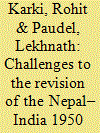|
|
|
Sort Order |
|
|
|
Items / Page
|
|
|
|
|
|
|
| Srl | Item |
| 1 |
ID:
139294


|
|
|
|
|
| Summary/Abstract |
The contemporary strategic and political environment has gone through tremendous changes in comparison to the context in which the 1950 treaty was signed. The Indian prime minister Narendra Modi’s August 2014 visit to Nepal, the first by an Indian prime minister in 17 years, has rekindled the hope of improving Nepal–India relations, including revision of the 1950 treaty. Against this backdrop, this article argues that without understanding India’s strategic, security-related and political concerns, revision of the 1950 treaty is highly unlikely. The article further argues that by identifying and addressing the key challenges, both countries can develop a shared strategic vision which in turn can provide an enhanced framework for the revision of the 1950 treaty and further strengthen the ‘special’ Nepal–India relationship in the changed strategic context of the 21st century.
|
|
|
|
|
|
|
|
|
|
|
|
|
|
|
|
| 2 |
ID:
126093


|
|
|
|
|
| Publication |
2013.
|
| Summary/Abstract |
Nepal's King Prithvi Narayan Shah's famous 'Yam between two boulders' quote reflects the great understanding of Nepal's security dilemma, even as far back as the 18th century. 1 This has remained a cornerstone of Nepal's foreign policy to date, primarily driven by Nepal's geographic location. 2 Shah understood well that Nepal would always remain insecure vis-à-vis its powerful neighbours, that is, China and India, and urged the need to keep refining, adapting and adjusting Nepal's foreign policy in order to deal with its powerful regional neighbours. However, successive Nepalese governments have looked to build ties with its powerful neighbours to bolster their own hold on power rather than to maintain the difficult balancing act outlined by Shah. This trend will continue in the foreseeable future, unless Nepal as a nation is ready to conduct its foreign policy as per the imperatives of the 21st century world, dominated by the rise of China and India. While both China and India are competing for global and regional influence, there is also a concern about securing their interests in their close neighbourhoods. Both countries are vying for influence in Nepal as they fear that Nepali soil can be used to harm their respective core interests. 3 Ultimately, as argued by Manish Dabhade and Harsh V. Pant, both countries have increased their interference in Nepal, while severely undermining 'Nepal's sovereignty and its ability to cope' with these regional giants effectively. 4 In light of this, this commentary focuses its attention on the primacy of the element of change in Nepal's foreign policy and attempts to propose 'trilateral security cooperation' as a new foreign policy for Nepal to manage the growing China-India strategic interests in Nepal. The proposed change in Nepal's foreign policy is to manage the increasing foreign and security policy challenges of China and India in Nepal.
|
|
|
|
|
|
|
|
|
|
|
|
|
|
|
|
|
|
|
|
|